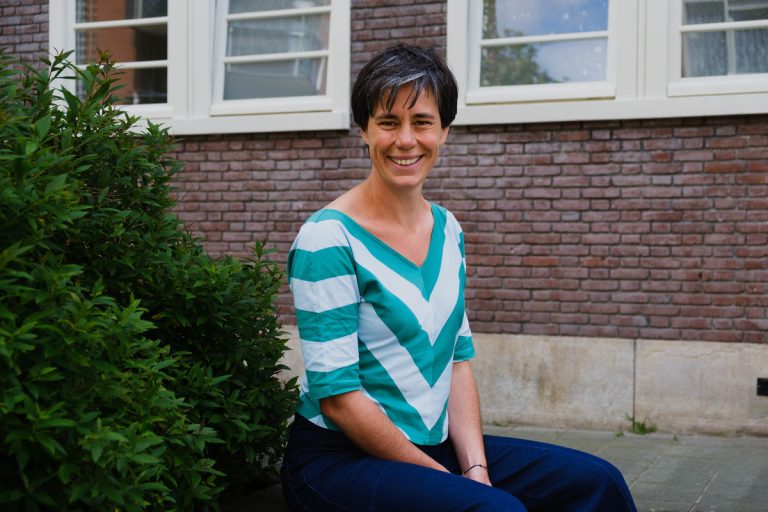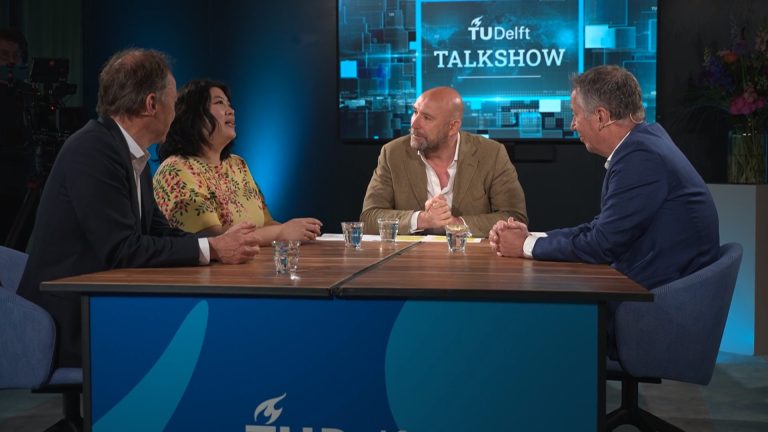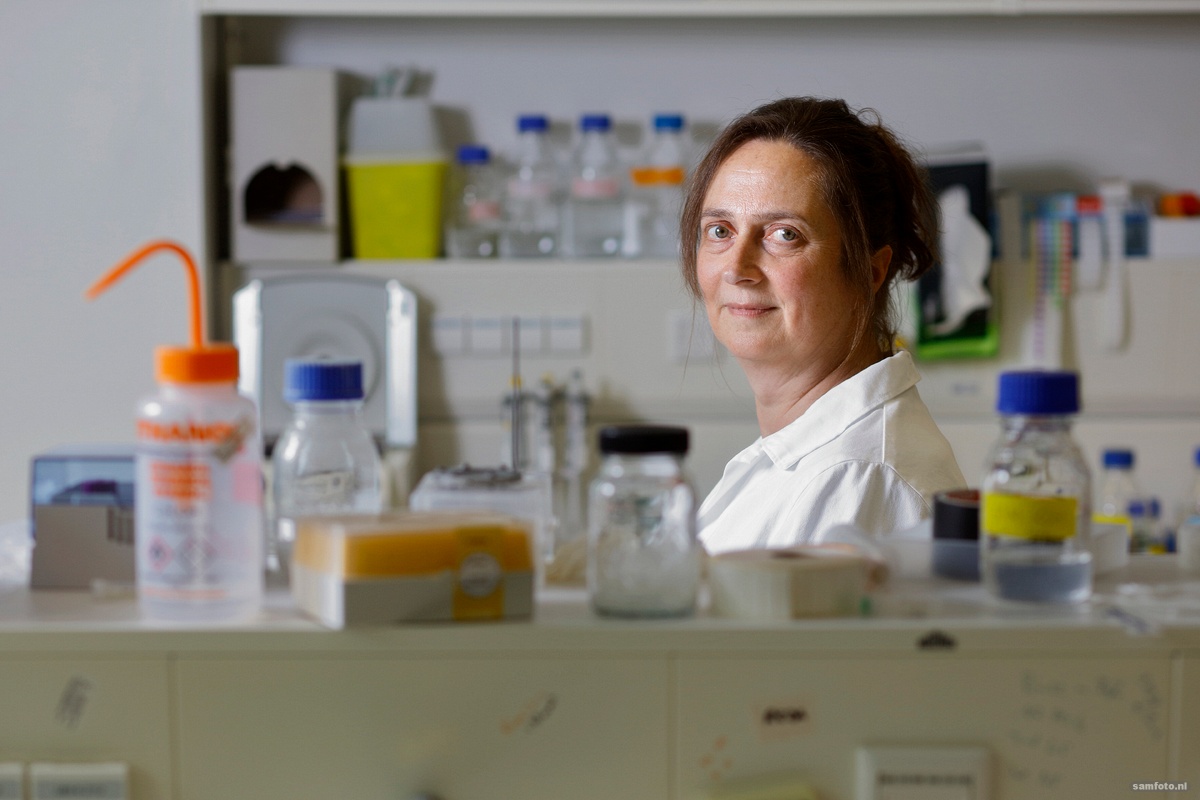To increase knowledge security, screening of researchers from outside Europe is in the making. Not a good idea, says KNAW President and TU Delft professor Marileen Dogterom.
TU Delft full professor of bionanoscience Marileen Dogterom: “My field spans the entire globe and is extremely multidisciplinary.” (Photo: Sam Rentmeester)
Several political parties have expressed serious concerns about knowledge security at universities, and any incident in this area immediately sets off the alarm bells. We’ve been a bit naive, said Education Minister Robbert Dijkgraaf on the matter.
China in particular is in the spotlight. Researchers at TU Delft were found to be unintentionally helping the Chinese army. The human rights centre at Vrije Universiteit Amsterdam, which has now closed, received Chinese funding. Chinese PhD candidates were required to pass information to their embassy.
As security agencies continue to issue strong warnings, the Royal Netherlands Academy of Arts and Sciences (KNAW) believes that the situation with regard to knowledge security in the Netherlands has now improved. Last year, the government opened a service desk (in Dutch) for researchers who might have questions. A guideline on knowledge security in scientific research has also been drawn up.
‘Just slamming the door shut doesn’t seem like a solution’
The government believes this does not go far enough, however. It is considering introducing systematic screening of researchers coming to this country from outside Europe. The KNAW writes in a new position paper that this would be disproportionate.
KNAW President Marileen Dogterom is a University Professor at Delft University of Technology and understands how important knowledge security is. Together with other scientists in the Netherlands and abroad, she is working on building synthetic cells.
“It is fundamental research, where we are trying to understand how living cells work by replicating them”, says Dogterom. “We dream of one day being able to use cell-like systems to produce certain substances in a sustainable way. Research programmes similar to this are also running in China. The scientists working in these programmes are keen to collaborate with us. We’re presently in the midst of this.”
There are important criteria to consider when choosing to collaborate with them, she says. “We talk with our own university, our knowledge security team and anyone else who has expertise in this field, as well as seeking advice from the government. How should the collaboration be shaped? How do we ensure that both parties benefit?”
Suppose someone says, based on their gut feeling or intuition, that you shouldn’t collaborate at all with a country like China, where there is no academic freedom. What could you answer?
“That is a complicated question. My field spans the entire globe and is extremely multidisciplinary. We’re part of a European research consortium, but research similar to ours is also being conducted in the United States and Asia. China is part of a consortium that includes the likes of Japan, Singapore, Australia and South Korea. These are countries we might want to collaborate with. Would we be prevented from doing that? And if there were no obstacles, why then can’t we collaborate directly with China? It really is a puzzle, and just slamming the door shut doesn’t seem like a solution.”
‘It’s not a good idea to leave the researcher out of the equation altogether’
If it’s so complicated, can you leave that responsibility to scientists? Surely they prefer to do research without getting into geopolitical issues?
“We ask scientists also to explore the principles of scientific integrity, so why shouldn’t they also examine these issues? Of course, they need support in doing so. Researchers should talk to their supervisors, the security team at their university or, if necessary, the executive board, but it’s not a good idea to leave the researcher out of the equation altogether. They know the most about their particular field.”
The KNAW says there’s little point in screening all incoming researchers and scientists from outside Europe, as that can lead to a false sense of security.
“Indeed. Suppose you decide to screen large groups of researchers, except for those with European passports… If I had ill-intentioned motives, I’m pretty certain I’d know how to get around this. Risks are a constant factor that you have to try to minimise and weigh as reasonably as you can against other risks.”
What other risks are you referring to?
“The greatest risk is that international collaboration and knowledge exchange, both of which are absolutely essential, will be halted. In the Netherlands, we have a system of academic freedom and open collaboration with other countries. This is fundamental to our progress.”
The KNAW believes the government should instead focus on raising ‘awareness’ amongst researchers and scientists. Isn’t that just creating a false sense of security?
“No, I don’t think so. Of course, we can’t eliminate every risk, but neither can the government for that matter.”
‘Awareness is always very important’
If scientists still don’t see the problem after all the incidents that have occurred, does it help to ‘focus on raising awareness’?
“Whatever course of action the government chooses, awareness is always very important. Also, it’s clearly on the rise. Most universities now have a knowledge security team, for example.”
The KNAW says the government should assign responsibility for knowledge security where it belongs: the universities themselves. That sounds a bit like placing responsibility for the fight against drug trafficking with the port authorities themselves.
“But drug trafficking is illegal, so that’s a clear difference. The fight against crime is the government’s responsibility. That is less complicated than the considerations surrounding scientific collaboration.”
You can say: leave awareness and everything it involves to us; don’t worry, we’ll sort it. But it’s not strange surely if there is some control exercised?
“No, that is not strange. The ministry is conducting an audit of policies related to knowledge security. The focus is on research universities to begin with, followed by universities of applied sciences and knowledge institutions. The audit revolves around the question: what is being done at the universities, and is there scope for improvement? What arrangements are in place, and what is yet to be done? And I couldn’t agree more – an audit such as this is essential.”
Universities also have to screen their collaborative partners. Why, then, would it be unfeasible for the government to do this?
“Screening in a specific area might be possible. Sanctions against Iran and North Korea mean that we already conduct such screening for nuclear scientists. But it’s vital then that you clearly determine the area to which the screening relates.”
HOP, Bas Belleman / Translation: Taalcentrum-VU
- Also read our earlier interview with Marileen Dogterom, on trust in science, endangered researchers, women’s quotas and Recognition and Rewards, among other topics.
 Saar Slegers. (Photo: Jaden Accord)
Saar Slegers. (Photo: Jaden Accord)In the five-part ‘Vriend of Vijand’ (friend or foe, Human/VPRO broadcasting corporation, in Dutch) podcast series, science journalist and former Delta editor Saar Slegers is examining the predicaments behind the Dutch knowledge security policy and the impact that the policy will have on individual scientists. Among the people she talks to are Dutch and Iranian scientists, policy officers, people from the intelligence services, and Minister Dijkgraaf of the Ministry of Education. Slegers, like Dogterom, is critical of the new Knowledge Security Act, according to this Delta interview: ‘New knowledge security screening is counterproductive’.
 Peter Weijland, Cynthia Liem, Leon Heuts and Tim van der Hagen (left to right) at the TU Delft Talk Show on knowledge security. (Video still)
Peter Weijland, Cynthia Liem, Leon Heuts and Tim van der Hagen (left to right) at the TU Delft Talk Show on knowledge security. (Video still)Half of TU Delft research is viewed as ‘key technology’. This means that the new Knowledge Security Act will have major consequences. TU Delft dedicated a talk show to the subject in June, in which rector magnificus Tim van der Hagen voiced criticism of the law like the other table guests. “For 15 years we were encouraged to establish partnerships with China. One delegation had barely returned when the next one left. And suddenly every Chinese doctoral candidate is under suspicion.”
Read the full report here.
What specifically is TU Delft doing about knowledge security? You can read about it here.
Do you have a question or comment about this article?
redactie@hogeronderwijspersbureau.nl


Comments are closed.